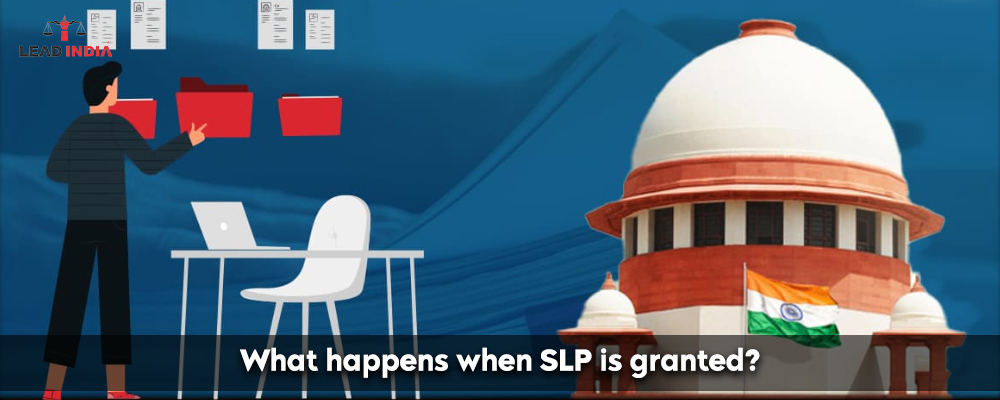A Special Leave Petition (SLP) is a special channel through which petitioners seeking justice outside of the customary appellate channels might obtain it in Indian judicial proceedings. A petitioner’s legal journey reaches a turning point when their Special Leave Petition is approved by the Supreme Court.
Need A Legal Advice
The internet is not a lawyer and neither are you. Talk to a real lawyer about your legal issue

Special Leave Petition: About
- Special Leave Petition is a discretionary remedy available under Article 136 of the Indian Constitution, granting the Supreme Court the authority to grant special leave to appeal from any judgement, decision, finding, sentence, or order in any case or matter rendered by any tribunal or court operating within the borders of India.
- The Supreme Court has the discretion to entertain an SLP if it deems fit, taking into account the importance of the issue raised or the presence of exceptional circumstances. This discretionary power enables the Supreme Court to act as a final arbiter in matters of national importance or those requiring urgent intervention.
Implications of a Grant of Special Leave Petition
Granting of Appeal:
- The primary implication of a granted Special Leave Petition is that the Supreme Court has exercised its discretion to entertain the appeal.
- This signifies that the Court finds merit in the issues raised and believes that the case warrants a thorough examination, often due to its legal complexity, constitutional significance, or a substantial question of law involved.
Review of Lower Court’s Decision:
- When a Special Leave Petition is granted, the Supreme Court undertakes a review of the lower court’s decision.
- This involves a comprehensive examination of the legal arguments, evidence presented, and the reasoning employed by the lower court in arriving at its judgment.
- The Supreme Court may either affirm, modify, or overturn the decision based on its assessment of the case.
Precedent Setting:
- The decisions rendered by the Supreme Court in Special Leave Petitions have a far-reaching impact as they often establish legal precedents.
- The Court’s rulings in these cases can guide lower courts in similar matters and shape the legal landscape by clarifying or evolving legal principles.
Constitutional Interpretation:
- In cases involving constitutional issues, the granting of a Special Leave Petition allows the Supreme Court to interpret and clarify constitutional provisions.
- This is crucial for the development and evolution of constitutional law, ensuring that the Constitution remains a dynamic and living document capable of adapting to the changing needs of society.
Legal Certainty:
- The grant of a Special Leave Petition provides a degree of legal certainty to the parties involved.
- It offers them the opportunity to present their case before the highest court in the land, ensuring that justice is not only done but is also seen to be done.
- This contributes to the overall confidence in the legal system.
Finality of Judgment:
- A judgment delivered by the Supreme Court in a Special Leave Petition is generally considered final.
- Once the apex court has pronounced its decision, there are limited avenues for further appeal.
- This contributes to the principle of judicial finality, bringing closure to the legal dispute.
Remedy in Exceptional Circumstances:
- Special Leave Petitions are often filed in cases where there are exceptional circumstances or issues of paramount importance.
- The grant of an SLP allows the Supreme Court to step in and address these exceptional situations, ensuring that justice is not denied due to rigid procedural or jurisdictional constraints.
Public Interest Litigation (PIL):
- In cases involving public interest, the granting of a Special Leave Petition can have broader societal implications.
- Public Interest Litigations often find their way to the Supreme Court through SLPs, allowing the court to address matters of public concern and interest.
In extraordinary circumstances where justice demands involvement beyond the regular appellate procedure, the Supreme Court can exercise its jurisdiction through the Special Leave Petition, a discretionary remedy that acts as a safety valve in the legal system. The finality of the Supreme Court’s decision in an SLP ends the legal issue and upholds the rule of law, justice, and fairness in the Indian legal system.
One can talk to lawyers from Lead India for any kind of legal support. In India, free legal advice online can be obtained at Lead India. Along with receiving free legal advice online, one can also ask questions to the experts online free through Lead India.





 Talk to a Lawyer
Talk to a Lawyer